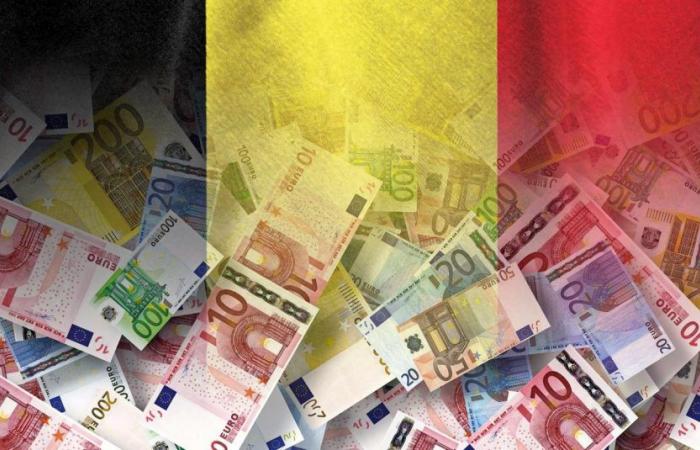Our banks can rub their hands. All the money invested in the September 2023 government bonds has returned to their accounts. But, in finance as elsewhere, there is never a free lunch.
Mission accomplished for the banks. We can even say that the battle to repatriate the billions lost from the September 2023 bond will have finally come to an end. Less than 400 million: this is the amount collected by the latest state bond. A figure that pales in comparison to the success experienced last year by Vincent Van Peteghem’s voucher which had enabled – but it must still be remembered – to raise nearly 22 billion euros from the population.
For the Debt Agency, which has also launched itself into the race for billions of state bonds, it is therefore a failure! Its director, Jean Deboutte, hoped to keep around 4 billion of the 22 billion reimbursed to savers at the beginning of September. With 382 million euros invested in the new issue, we are far from the set objective. Instead of recovering between 15 and 20% of the money reimbursed to savers, less than 2% of the money was reinvested in the new issue by the Belgians.
Whose fault is it? First, of course, to interest rates. Last year, they were on the rise. This year, they are down. A reversal of trend to which must be added a classic withholding tax of 30% which was applied to the new government offer. As a logical consequence, this new offer from the State was accompanied by an interest rate of 1.93% which was well below the 2.81% net offered last year by the Minister of Finance. Its one-year bond had benefited not only from a withholding tax reduced to 15%, but also from banking competition that was significantly less keen than at the start of autumn 2024.
Inflated Yields
A year later, none of that, quite the contrary. The banks are rubbing their hands. While the sector suddenly saw a mass of deposits disappear last year, this time it left only crumbs for the State. Just three days after the launch of the new campaign, BNP Paribas Fortis indicated that it had already “captured” more than two billion euros thanks to its offer aimed at competing with the new public bond. Of the 6.9 billion euros invested last year by its clients in the September 2023 state bond, this was already almost a third repatriated for the country’s leading bank.
It must be said that after the unpleasant surprise of September 2023, the big local banks (BNP Paribas Fortis, but also KBC, Belfius and ING) did not skimp on marketing to recover their loot. From the term account to the cash voucher, the battle raged on. Promising net returns much higher than the government’s offer, promotions to capture the money lent to the Belgian state last September have multiplied this summer.
It was ING which set the scene on fire with a new special “State bond” term account. The latter gave 3.80%, and even 4% for those who had pre-registered, i.e. a rate significantly higher than that in force on the bond market for the same maturity. A great offer on which Belfius quickly aligned itself, while warning that it could end its offer at any time.
KBC, for its part, launched a 13-month term account (rather than one year) in order to increase its gross return to just over 4%. And we have not remained idle on the side of small banks either: MeDirect, Crelan, Deutsche Bank and even Beobank have also offered high rates on their term accounts to compete with government bonds during the subscription period.
As for BNP Paribas Fortis, the country’s leading bank, it left with a share of the pie thanks to structured products and several savings certificates, offering, here too, rates higher than the State’s offer and well above beyond those in force on the market.
Trimmed margins
Of course, after this charm offensive, the sails were quickly reduced. Less than a week after the end of the subscription campaign for the latest government bonds, the rates on these term accounts were adapted and revised downwards. However, in economics, everything ends up paying for itself. It is clear that the big banks (and some smaller ones) have temporarily cut into their margins to attract customers. And some, like Argenta, could well pay dearly for this aggressive strategy on term accounts. Although the Antwerp bank recorded a net profit of 160 million euros in the first half, this nevertheless fell by 10% compared to the previous year. A drop which is mainly explained by the sharp increase in interest paid by Argenta to its customers on its accounts (term and savings) during the one-year state bond campaign in September 2023, when it was aligned with its rate of 2.81% net.
If the cost of the strategy to recover funds invested in government bonds can vary from one institution to another, it therefore potentially amounts to hundreds of millions of euros for the banking sector as a whole. Director of economic research at IESEG, the management school based in Lille and Paris, Eric Dor nevertheless recalls that the cost of resources that banks have just recovered from their liabilities, in the form of term deposits or cash vouchers , is to be compared with the return on new loans or other new investments by which they are used as assets.
“It is true that some banks have gone so far as to offer 3.8% on one-year term deposits, but this cost must be put in relation to the rates at which they can use the money thus collected, under form of new loans or other investments. Of course, banks would lose money if they simply placed this new collection on the deposit facility at the BNB, since, following the ECB’s decision, its rate will drop to 3.5% from this Wednesday , and will continue to decline subsequently.”
Disappointed customers
However, adds Eric Dor, “if we refer to the BNB and ECB statistics for July, the average rates on new loans from Belgian banks, with the exception of real estate loans, are well above 3, 8%”, underlines the economist, referring to the rates for categories of new loans such as consumer credit or those linked to a credit card which can easily approach the 10% mark. Therefore, “banks should be able to avoid any loss on the money they have recovered from the reimbursement to their customers of the September 2023 state bond”, estimates Eric Dor.
Where the banks have undoubtedly also limited costs is by playing on the limited nature of the offers. Many customers were unable to take advantage of the attractive rates offered as they were reserved for new money, that is to say, savings which were not already in the account.
“If the banks had significantly increased the average interest rate on the entire stock of deposits on their liabilities, it would have been necessary to compare it to the average yield on the entire stock of their loans, old and new. There could then have been a big problem because many old loans were granted at very low rates, explains Eric Dor. But the banks have avoided doing this. Their strategy has rather been to limit itself to offering attractive rates on part of their liabilities, namely term deposits or cash certificates, and sometimes even limiting access to new money, resulting from repayment government bonds or accounts with other banks.”
“Their strategy was rather to limit themselves to offering attractive rates on part of their liabilities, term deposits or savings certificates.” – Eric Dor (IESEG)
The truth is that they mainly looked out for their own interests rather than those of passive savers who leave their money in a regular savings account. Only dynamic savers who looked elsewhere were able to get a better return for their money. For the latter, the infidelity made to their bank paid off. And as Eric Dor points out, “it even paid twice for those who had taken advantage of the September 2023 state bond and who today took advantage of attractive offers from banks to get them back”.
Compensation
What about the disappointed? Disappointed people who risk being all the more so since some have mentioned the possibility of seeing mortgage loans be negatively impacted by way of compensation… Recently, Pierre Wunsch, the governor of the National Bank, expressed, on the VRT plateaus, its concern about the risks of increased competition. Banks are only just emerging from a long period of very low interest rates, which also affected mortgage lending. “There is now competition between banks, perhaps even too much,” declared our chief financier. Banks have mortgage loans on their balance sheet at 1.5% for 20 years. So they can’t give everyone 3.8% interest on a term account.”
So, will mortgages become more expensive because of the battle for government bond money? The only certainty: Belgian banks are seeing the profitability of mortgage loans fall under the effect of fierce competition and low fixed rates. During the presentation of the results of BNP Paribas Fortis, its CEO, Michael Anseeuw, revealed that the bank’s margins on these loans had fallen by 70%. A pressure on margins which was obviously further accentuated with the hunt for the 22 billion euros that went to state bonds last year, by sharply increasing the remuneration of savings products to attract customers. The fact remains that these mortgage loans which have become less lucrative are, as we have said, offset by other types of credit or other products whose margins remain comfortable.
Because as Eric Dor explains, “the medium and long term strategy of the banks was above all to recover this money from their clients in order to be able to offer them subsequently, within a year for example, investments on which they can generate commissions or good margins.”
382 million euros = the sum collected by the last one-year government bond.






